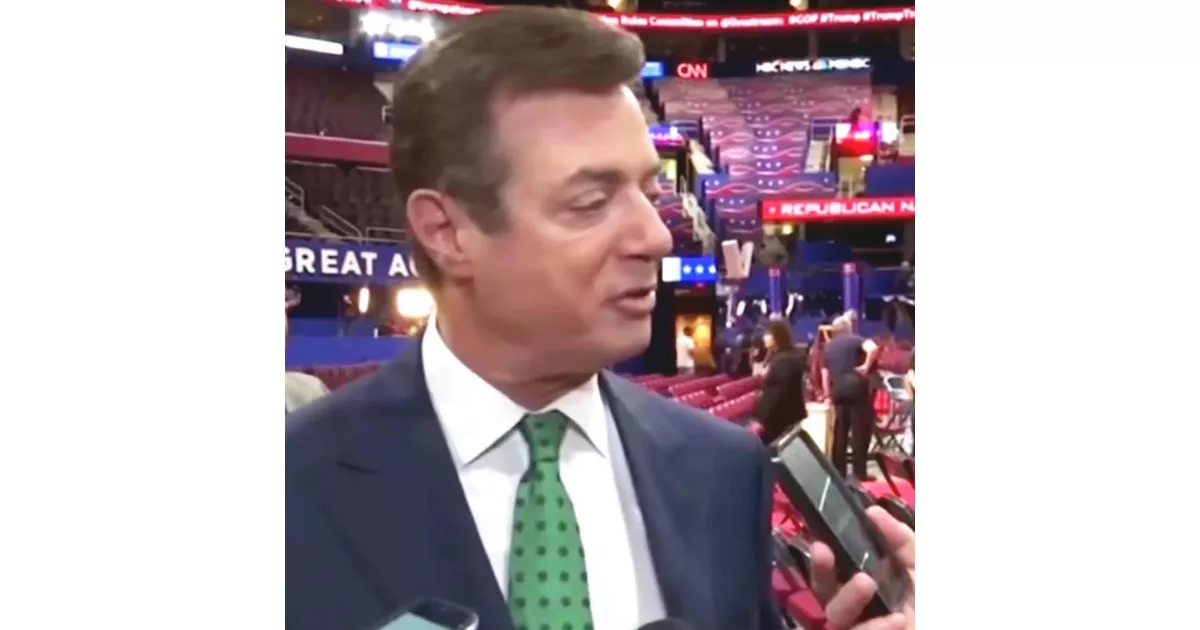Controversies are a part of history. Explore the biggest scandals linked to Paul Manafort.
Paul Manafort is an American former lobbyist, political consultant, and attorney. He has worked on several Republican presidential campaigns, including serving as chairman of Donald Trump's campaign from June to August 2016. Manafort co-founded the lobbying firm Black, Manafort & Stone in 1980, representing various foreign leaders, including controversial figures like Viktor Yanukovych, Ferdinand Marcos, and Mobutu Sese Seko. His lobbying activities eventually led him to retroactively register as a foreign agent under the Foreign Agents Registration Act (FARA).
1981: Manafort's father indicted in corruption scandal
In 1981, Paul Manafort's father was indicted in a corruption scandal but not convicted.
June 1984: Manafort was a FARA-registered lobbyist for Saudi Arabia
Between June 1984 and June 1986, Paul Manafort was a FARA-registered lobbyist for Saudi Arabia.
1985: BMSK signed contract with Jonas Savimbi
In 1985, Paul Manafort's firm, BMSK, signed a $600,000 contract with Jonas Savimbi, the leader of the Angolan rebel group UNITA, to refurbish Savimbi's image in Washington and secure financial support.
May 1986: Manafort resigned his directorship at OPIC
In May 1986, Paul Manafort resigned his directorship at OPIC.
June 1986: Manafort was a FARA-registered lobbyist for Saudi Arabia
Between June 1984 and June 1986, Paul Manafort was a FARA-registered lobbyist for Saudi Arabia.
1989: Lobbying for Mobutu Sese Seko
In 1989, Paul Manafort was involved in lobbying for Mobutu Sese Seko of Zaïre, securing a US$1 million annual contract.
1990: Received Funds from Kashmiri American Council
In 1990, Paul Manafort began receiving payments from the Kashmiri American Council, totaling $700,000 between 1990 and 1994. These funds were ostensibly to promote the Kashmiri people's plight, but were later revealed by an FBI investigation to be from Pakistan's Inter-Service Intelligence (ISI) as part of a disinformation campaign.
1991: Lobbying for various governments
In 1991, Paul Manafort's firm lobbied on behalf of the governments of the Dominican Republic, Equatorial Guinea, Kenya, and Nigeria, earning substantial amounts.
1993: Lobbying for various governments
In 1993, Paul Manafort's firm lobbied on behalf of the governments of the Dominican Republic, Equatorial Guinea, and Kenya, earning between $660,000 and $750,000 each year.
1994: FBI Investigation into Kashmiri American Council Funds
Between 1990 and 1994, Paul Manafort received $700,000 from the Kashmiri American Council, which an FBI investigation revealed was actually from Pakistan's Inter-Service Intelligence (ISI) agency. The ISI used the funds for a disinformation operation, while Manafort pretended to be a CNN reporter while producing a documentary as part of the deal.
1995: Campaign Strategy for Édouard Balladur
In 1995, Manafort wrote the campaign strategy for Édouard Balladur in the French elections. He received indirect payments of at least $200,000 through Lebanese arms-dealer Abdul Rahman al-Assir, originating from middle-men fees for the sale of French Agosta-class submarines to Pakistan, in what became known as the Karachi affair scandal.
December 2004: Advising Yanukovych's Presidential Campaign
In December 2004, Manafort began working as an advisor on the Ukrainian presidential campaign of Yanukovych and his Party of Regions. This continued until the February 2010 Ukrainian presidential election, despite U.S. government opposition to Yanukovych due to his ties to Russia.
2005: Contract with Deripaska to Promote Russian Interests
In 2005, Manafort began a $10 million annual contract with Deripaska to promote Russian interests in politics, business, and media coverage in Europe and the United States.
2007: Undisclosed Payments Begin
In August 2016, the Ukrainian government National Anti-Corruption Bureau claimed to have found handwritten records showing $12.7 million in cash payments designated for Manafort from 2007 to 2012.
February 2010: End of Advising Yanukovych's Presidential Campaign
From December 2004 until February 2010, Manafort worked as an adviser on the Ukrainian presidential campaign of Yanukovych and his Party of Regions, despite U.S. government opposition to Yanukovych due to his ties to Russia's leader Vladimir Putin.
2010: Payments from Ukrainian Sponsors Alleged
During Manafort's trial, federal prosecutors alleged that between 2010 and 2014, Manafort received over $60 million from Ukrainian sponsors, including Akhmetov.
2010: Loan from Deripaska
In 2010, Deripaska loaned Manafort $10 million, which, according to testimony at Manafort's 2018 trial, was never repaid.
2012: Activities for Pro-Russian Party in Ukraine
In June 2017, Manafort disclosed that he made more than $17 million between 2012 and 2014 working for a pro-Russian political party in Ukraine.
2012: Secret Lobbying Payments
The Associated Press reported on August 17, 2016, that in 2012 Manafort secretly routed at least $2.2 million in payments to two Washington lobbying firms on behalf of the Party of Regions, obscuring the foreign political party's efforts to influence U.S. policy.
October 2014: Worked in Ukraine until October 2014 Ukrainian Parliamentary Election
Manafort claims he has not worked in Ukraine since the October 2014 Ukrainian parliamentary election. However, Ukrainian border control entry data shows he traveled to Ukraine multiple times after that election, all the way through late 2015.
2014: Alleged Involvement in Euromaidan Violence
According to leaked text messages between his daughters, in 2014 Manafort was one of the proponents of violent removal of the Euromaidan protesters, which resulted in police shooting dozens of people during the 2014 Hrushevskoho Street riots.
2014: Payments from Ukrainian Sponsors Alleged
During Manafort's trial, federal prosecutors alleged that between 2010 and 2014, Manafort received over $60 million from Ukrainian sponsors, including Akhmetov, who was believed to be the richest man in Ukraine.
2014: FBI Starts Criminal Investigation into Manafort
In 2014, the FBI reportedly began a criminal investigation into Paul Manafort shortly after Viktor Yanukovych was deposed during Euromaidan. This investigation predated the 2016 election.
2014: Viktor Yanukovych's overthrow
In 2014, the pro-Russian government of Viktor Yanukovych in Ukraine was overthrown.
2014: Activities for Pro-Russian Party in Ukraine
In June 2017, Manafort disclosed that he made more than $17 million between 2012 and 2014 working for a pro-Russian political party in Ukraine.
2015: Travels to Ukraine until late 2015
Although Manafort claimed to have stopped working in Ukraine after the October 2014 elections, data shows he traveled there several times through late 2015.
2015: Financial Records Show Debt
In December 2015, financial records filed by Manafort in Cyprus showed approximately $17 million in debt to interests connected to Putin and Yanukovych before joining the Trump campaign.
June 9, 2016: Meeting at Trump Tower with Russian attorney
On June 9, 2016, Paul Manafort, Donald Trump Jr., and Jared Kushner participated in a meeting with Russian attorney Natalia Veselnitskaya and others at Trump Tower, with the expectation of receiving damaging information on Hillary Clinton.
August 2016: Manafort leaves Trump campaign
After leaving the Trump campaign in August 2016, the Mueller investigation reviewed loans Paul Manafort received, including $7 million from Oguster Management Limited.
August 2016: Connections to Viktor Yanukovych drew attention
In August 2016, Paul Manafort's connections to former Ukrainian President Viktor Yanukovych and his pro-Russian Party of Regions drew national attention in the US, where it was reported that Manafort may have received $12.7 million in off-the-books funds from the Party of Regions.
August 2016: Allegations of Undisclosed Cash Payments
In August 2016, Ukrainian government National Anti-Corruption Bureau claimed to have found handwritten records showing $12.7 million in cash payments designated for Manafort from 2007 to 2012, though it was undetermined if he received the money. These payments were from the pro-Russian Party of Regions. Manafort's lawyer denied he received any such payments.
2016: Offered Briefings to Deripaska
During the 2016 Presidential campaign, Manafort, via Kilimnik, offered to provide briefings on political developments to Deripaska.
2016: Manafort a Person of Interest in FBI Probe
In 2016, Paul Manafort became a person of interest in the FBI counterintelligence probe looking into the Russian government's interference in the 2016 presidential election.
2016: Manafort met with Konstantin Kilimnik
In 2016, Paul Manafort met with Konstantin Kilimnik, a likely Russian intelligence officer, while he was campaign chairman.
January 19, 2017: Manafort Under Investigation by Federal Agencies
On January 19, 2017, the eve of Trump's presidential inauguration, it was reported that Paul Manafort was under active investigation by multiple federal agencies, based on intercepted Russian communications and financial transactions.
March 2017: Investigation into Manafort's mortgage fraud launched
In March 2017, an investigation was launched by the Manhattan District Attorney into Manafort for 16 charges related to mortgage fraud.
April 2017: Planning to File FARA Paperwork
In April 2017, a Manafort spokesman said Manafort was planning to file the required paperwork under the Foreign Agents Registration Act (FARA) for his lobbying activities.
May 2017: Discussed Assange Deal
In May 2017, Manafort and Lenín Moreno discussed the possibility of Manafort brokering a deal for Ecuador to relinquish Julian Assange to American authorities in exchange for concessions such as debt relief from the United States.
May 2017: Manafort Submits Documents to Senate Committee
In May 2017, Paul Manafort submitted over 300 pages of documents to the Senate Select Committee on Intelligence related to its investigation of Russian election meddling. On July 25, he met privately with the committee.
May 17, 2017: Mueller Appointed Special Counsel
On May 17, 2017, Robert Mueller was appointed as Special Counsel by the Justice Department to oversee the investigation into Russian interference in the 2016 United States elections, taking over the existing criminal probe involving Paul Manafort.
June 2, 2017: Failure to Register as Foreign Agent
As of June 2, 2017, Manafort had not yet registered under the Foreign Agents Registration Act (FARA), despite lobbying for foreign countries.
June 27, 2017: Manafort retroactively registered as a foreign agent.
On June 27, 2017, Paul Manafort retroactively registered as a foreign agent, as lobbying to serve the interests of foreign governments requires registration with the Justice Department under the Foreign Agents Registration Act (FARA).
July 2017: New York Prosecutors Subpoena Information About Loans
In July 2017, New York prosecutors subpoenaed information about the loans issued to Paul Manafort during the 2016 presidential campaign. These loans represented about a quarter of the bank's equity capital.
July 26, 2017: FBI Raids Manafort's Home
On July 26, 2017, FBI agents, under the direction of Special Counsel Robert Mueller, conducted a raid on Paul Manafort's Alexandria, Virginia home, seizing documents and other materials related to Russian meddling in the 2016 election.
September 2017: Report of FBI Wiretapping Manafort
In September 2017, CNN reported that Paul Manafort was wiretapped by the FBI before and after the election, including when he was known to talk to President Donald Trump. Surveillance reportedly began in 2014.
September 25, 2017: Kurdistan Region independence referendum
On September 25, 2017, Paul Manafort assisted in organizing the Kurdistan Region independence referendum. He was hired by Masrour Barzani, the son of the President of the Kurdistan Region. The referendum was not supported by United States Secretary of Defense James Mattis.
October 27, 2017: Manafort and Rick Gates indicted
On October 27, 2017, Paul Manafort and his business associate Rick Gates were indicted in the U.S. District Court for the District of Columbia on multiple charges arising from consulting work for Viktor Yanukovych's pro-Russian government in Ukraine before Yanukovych's overthrow in 2014, at the request of Robert Mueller's Special Counsel investigation.
October 30, 2017: Manafort Arrested by the FBI
On October 30, 2017, Paul Manafort was arrested by the FBI after being indicted by a federal grand jury as part of Mueller's investigation into the Trump campaign. The indictment charged Manafort and Rick Gates with conspiracy against the United States, money laundering, and other offenses.
November 30, 2017: Manafort Reached Bail Agreement
On November 30, 2017, Paul Manafort's attorneys said that Manafort had reached a bail agreement with prosecutors that would free him from house arrest. He offered bail in the form of $11.65 million worth of real estate.
2017: Payment Accepted from Kurdistan Region
In 2017, The New York Times reported that Manafort accepted payment from the Kurdistan Region to facilitate Western recognition of the 2017 Kurdistan Region independence referendum.
2017: Dowd Broached the Idea of Presidential Pardon
In 2017, former Trump attorney John Dowd reportedly broached the idea of a presidential pardon for Paul Manafort with his attorneys.
2017: FBI Search Warrant Reveals Loan from Deripaska
In July 2017, an FBI search warrant application revealed that a company controlled by Manafort and his wife had received a $10 million loan from Deripaska.
January 3, 2018: Manafort challenges Mueller's authority in lawsuit
On January 3, 2018, Paul Manafort filed a lawsuit challenging the broad authority of Special Counsel Robert Mueller and alleging that the Justice Department's appointment of Mueller violated the law. The Justice Department responded, calling the lawsuit frivolous.
February 2, 2018: Department of Justice seeks to dismiss Manafort's civil suit
On February 2, 2018, the Department of Justice filed a motion seeking to dismiss the civil suit Manafort brought against Mueller.
February 22, 2018: Manafort and Gates charged with tax avoidance and bank fraud
On February 22, 2018, Paul Manafort and Rick Gates were additionally charged with crimes involving a tax avoidance scheme and bank fraud in Virginia. The indictment alleged that Manafort, aided by Gates, laundered over $30 million through offshore bank accounts between approximately 2006 and 2015.
February 23, 2018: Gates pleads guilty, Manafort maintains innocence
On February 23, 2018, Rick Gates pleaded guilty in federal court to lying to investigators and engaging in a conspiracy to defraud the United States. Manafort expressed disappointment and maintained his innocence.
February 28, 2018: Manafort pleads not guilty and is reprimanded
On February 28, 2018, Paul Manafort entered a not guilty plea in the District Court for the District of Columbia. Judge Jackson set a trial date of September 17, 2018, and reprimanded Manafort and his attorney for violating her gag order.
March 8, 2018: Manafort pleads not guilty in Virginia federal court
On March 8, 2018, Paul Manafort pleaded not guilty to bank fraud and tax charges in federal court in Alexandria, Virginia. Judge T. S. Ellis III set the trial to begin on July 10, 2018.
April 27, 2018: Judge dismisses Manafort's suit against Mueller
On April 27, 2018, Judge Jackson dismissed the civil suit Manafort brought against Mueller, citing precedent against interfering in ongoing criminal cases, but made no judgment on the arguments presented.
June 8, 2018: Manafort and Kilimnik indicted for obstruction of justice
On June 8, 2018, Paul Manafort and Konstantin Kilimnik were indicted for obstruction of justice and witness tampering, involving attempts to convince others to lie about undisclosed lobbying for Ukraine's former pro-Russian government.
June 15, 2018: Manafort's bail revoked
On June 15, 2018, Judge Jackson revoked Paul Manafort's bail due to obstruction of justice and witness tampering charges, ordering him held in jail until his trial. He was booked into the Northern Neck Regional Jail.
June 2018: Additional charges filed against Manafort
In June 2018, additional charges were filed against Paul Manafort for obstruction of justice and witness tampering that are alleged to have occurred while he was under house arrest, and he was ordered to jail.
June 2018: Manafort Jailed
Paul Manafort was jailed from June 2018 until May 2020.
July 6, 2018: Manafort requests venue change
On July 6, 2018, Manafort moved the court for a change of venue to Roanoke, Virginia, citing Alexandria's D.C. suburbia status, abundant and significantly negative press coverage, and the margin by which Hillary Clinton won the Alexandria Division in the 2016 presidential election.
July 10, 2018: Trial date set for Manafort
On March 8, 2018, Judge T. S. Ellis III set July 10, 2018 as the trial date after Manafort pleaded not guilty in federal court in Alexandria, Virginia.
July 31, 2018: Manafort trial begins in Virginia
On July 31, 2018, Paul Manafort's trial began in the Eastern District of Virginia on eighteen charges including tax evasion, bank fraud, and hiding foreign bank accounts.
August 2018: Manafort convicted on eight charges
In August 2018, Paul Manafort stood trial in the United States District Court for the Eastern District of Virginia and was convicted on eight charges of tax and bank fraud.
September 13, 2018: Manafort and Trump Signed Joint Defense Agreement
On September 13, 2018, it was revealed that Paul Manafort and Donald Trump had signed a joint defense agreement allowing their attorneys to share information during the Mueller investigations.
September 14, 2018: Manafort enters plea deal
On September 14, 2018, Paul Manafort entered into a plea deal with prosecutors and pleaded guilty to two charges: conspiracy to defraud the United States and witness tampering.
September 2018: Trial scheduled for Manafort
Manafort's trial in the U.S. District Court for the District of Columbia was scheduled to begin in September 2018.
September 17, 2018: Trial date set for Manafort
On February 28, 2018, Jackson set September 17, 2018 as the trial date after Manafort pleaded not guilty in the District Court for the District of Columbia.
November 26, 2018: Mueller reported Manafort violated plea deal
On November 26, 2018, Robert Mueller reported that Paul Manafort violated his plea deal by repeatedly lying to investigators.
December 7, 2018: Special counsel alleges Manafort lied
On December 7, 2018, the special counsel's office filed a document with the court listing five areas in which they say Manafort lied to them, which they said negated the plea agreement.
2018: Trial for Fraud and Tax Evasion
In 2018, Manafort's trial for fraud and tax evasion included testimony regarding a $10 million loan from Deripaska in 2010, which was allegedly never repaid.
2018: Surf Horizon Limited Sues Manafort
In January 2018, Surf Horizon Limited sued Manafort and his business partner Richard "Rick" Gates, accusing them of financial fraud by misappropriating over $18.9 million invested in Ukrainian telecom companies.
January 2019: Manafort's lawyers filing reveals meeting with Konstantin Kilimnik
In January 2019, a filing by Paul Manafort's lawyers accidentally revealed that Manafort met with Konstantin Kilimnik, a likely Russian intelligence officer, and gave him polling data related to the 2016 campaign.
January 2019: Manafort resigns from Connecticut bar
In January 2019, ahead of a disbarment hearing, Paul Manafort resigned from the Connecticut bar and waived his right to ever seek readmission.
February 4, 2019: Court hearing regarding false statements
During a February 4, 2019, closed-door court hearing, special counsel prosecutor Andrew Weissmann suggested that Mueller's office continued to examine a possible agreement between Russia and the Trump campaign.
February 7, 2019: Prosecutors speculate Manafort concealed facts for pardon
On February 7, 2019, during a hearing prosecutors speculated that Manafort had concealed facts to enhance the possibility of his receiving a pardon. They said Manafort's work with Ukraine had continued after his plea deal.
February 13, 2019: Plea deal voided.
On February 13, 2019, D.C. District Court Judge Amy Berman Jackson concurred that Paul Manafort violated his plea deal, voiding the plea deal.
February 23, 2019: Filing was Plainly Deficient
The sentencing memorandum submitted by the Office of Special Council on February 23, 2019, stated that the filing was plainly deficient. Manafort entirely omitted [his] United States lobbying contracts ... and a portion of the substantial compensation Manafort received from Ukraine.
March 7, 2019: Manafort sentenced to 47 months in prison.
On March 7, 2019, Judge T. S. Ellis III sentenced Paul Manafort to 47 months in prison.
March 13, 2019: Manafort sentenced to additional 43 months in prison
On March 13, 2019, Judge Jackson sentenced Paul Manafort to an additional 43 months in prison.
May 9, 2019: Manafort disbarred from DC Bar
On May 9, 2019, Paul Manafort was disbarred from the DC Bar.
December 18, 2019: State charges against Manafort dismissed
On December 18, 2019, the state charges against Paul Manafort were dismissed because of the doctrine of double jeopardy.
August 2020: Senate Intelligence Committee concluded Manafort's contacts a grave counterintelligence threat.
In August 2020, the Republican-controlled Senate Intelligence Committee concluded that Paul Manafort's contacts with Konstantin Kilimnik and other affiliates of Russian intelligence "represented a grave counterintelligence threat".
August 2020: Senate Committee Concludes Manafort Worked to Undermine Evidence of Russian Interference
In its August 2020 final report, the United States Senate Select Committee on Intelligence concluded that, as Trump campaign manager, Paul Manafort worked with Kilimnik starting in 2016 on narratives that sought to undermine evidence that Russia interfered in the 2016 U.S. election and to direct such suspicions toward Ukraine.
August 2020: Senate Intelligence Committee Report on Manafort's Access and Influence
The fifth and final volume of the August 2020 Senate Intelligence Committee report noted that Paul Manafort had direct access to Trump and the Trump campaign's senior officials. The report found that beginning around 2004, Manafort worked for Deripaska and pro-Russian oligarchs in Ukraine, influencing the 2010 Ukrainian elections.
August 20, 2020: NY County District Attorney's Office appeals dismissal
On August 20, 2020, the New York County District Attorney's Office appealed the dismissal of the charges against Manafort to the New York Supreme Court, Appellate Division.
October 2020: Dismissal upheld by Appellate Division
In October 2020, a panel of the Appellate Division unanimously upheld the dismissal of charges against Paul Manafort.
December 2020: Manafort receives presidential pardon
In December 2020, Paul Manafort was pardoned for his federal crimes, but the Manhattan District Attorney's Office said it would continue to pursue state charges.
February 4, 2021: NY Court declines to hear appeal
On February 4, 2021, the New York Court of Appeals declined to hear the Manhattan District Attorney's appeal regarding Paul Manafort.
April 2021: Treasury Department Confirms Pipeline from Manafort to Russian Intelligence
In April 2021, a document released by the U.S. Treasury Department announcing new sanctions against Russia confirmed a direct pipeline from Paul Manafort to Russian intelligence during the 2016 U.S. presidential election campaign. Kilimnik provided the Russian Intelligence Services with sensitive information on polling and campaign strategy.
February 2023: Manafort agrees to pay $3.15 million to settle civil suit
In February 2023, Paul Manafort agreed to pay $3.15 million to settle a civil suit brought by the Justice Department in 2022 regarding undisclosed foreign bank accounts.
2023: Inflation Update on 2016 Amount
In 2023, The $12.7 million Manafort received in 2016 from the Party of Regions is equivalent to $15.8 million.
Mentioned in this timeline

Donald John Trump is an American politician media personality and...
Ukraine is a country in Eastern Europe the second-largest on...
Nigeria is a West African nation the most populous in...
Saudi Arabia officially the Kingdom of Saudi Arabia KSA is...
CNN Cable News Network is an American multinational news media...

Washington D C is the capital city and federal district...
Trending

55 minutes ago Yerin Ha's 'Bridgerton' Bathtub Scene Led to Folliculitis, Show Inclusion Unsure.

55 minutes ago Donovan Mitchell Out with Groin Injury, Cavaliers Optimistic About Recovery

55 minutes ago Benny Blanco Responds to 'Dirty Feet' Criticism, Selena Gomez Shows Support

56 minutes ago Reba McEntire Shines in 'Happy's Place', Praised by Belissa Escodebo for Charm

56 minutes ago Jey Uso Attacked Backstage on SmackDown Before Elimination Chamber Match: Injury Angle
2 hours ago Kenyon Sadiq's NFL Combine performance boosts 2026 draft stock; Broncos meeting confirmed.
Popular

Jesse Jackson is an American civil rights activist politician and...

XXXTentacion born Jahseh Dwayne Ricardo Onfroy was a controversial yet...

Michael Joseph Jackson the King of Pop was a highly...

Susan Rice is an American diplomat and public official prominent...

Barack Obama the th U S President - was the...

Hillary Diane Rodham Clinton is a prominent American politician lawyer...
